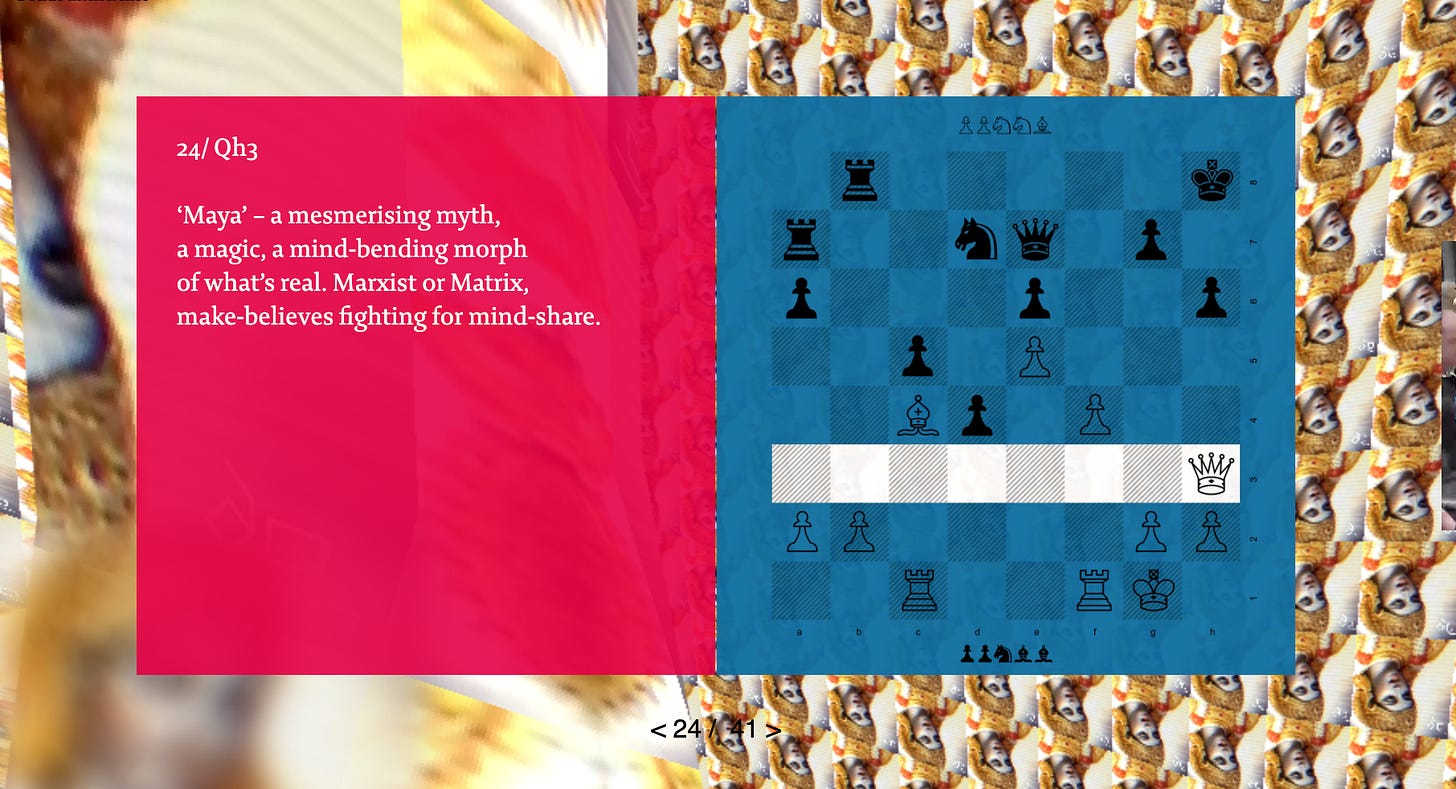I’m a Creative Director and poet. I’ve spent my life thinking about what writing can do. I work with exciting organisations to invent worlds, campaigns and artistic moments with language at their heart. I release new poetic objects every four months. I was the world’s second most awarded studio in the 2020 D&AD awards. This is a regular letter about my thinking and my work in progress.
In a 1917 essay ‘Tradition and the Individual Talent’, T.S. Eliot states ‘one error … of eccentricity in poetry is to seek for new human emotions to express; and in this search for novelty in the wrong place it discovers the perverse. The business of the poet is not to find new emotions, but to use the ordinary ones …’
Pfffff.
I have a new project to share with you – Game Six
It’s a bombardment of surreal footage, colour, chess diagrams, alliterative poetry and deepfake. It’s an exploration of post-truth politics, language and illusion. It is about how we decide our level of cognitive interference in a media landscape that thrives on us taking sides. It’s eleven minutes long.
It’s a collaboration between me, Studio Sutherl&, Keepitvisual and Modern Activity.
On Thursday 1st July, 7pm GMT, we’ll be talking about what inspired it, our creative process and previewing a one-night-only live installation in September, plus limited-edition book which will accompany the project.
You can sign up for the talk here
I do hope you can join us. But if you can’t here’s a very brief overview of some of the writing thinking that has gone into it.
Contrary to Eliot’s outlook, I think every age has a set of new emotions to contend with. Our consciousness evolves and our ever-morphing societies offer ever-new experiences. As horrific as the First World War was, I’m not sure the Modernists would have felt anything quite like the dragging, existential climate grief many people suppress today.
My own sense of climate grief wasn’t something I was aware of until I saw Extinction Rebellion use the term. The phrase surfaced something I had inarticulately buried.
Further back, the Romantic writers’ expressions of auto-biographical inner-experience can be said to have given rise to the modern world, or at least our concept of what it is to be a modern human.
(My personal pin-up Romantic, Coleridge, appears at move 27 of Game Six.)
And now, the relentless dislocation of facts, the real-time triggering and trolling, and the raging news-fires permanently available on social media is a radically contemporary experience that we cope with as best we can. One which Eliot could never have imagined.
From the Romantic sense-of-self to climate grief to our current post-truth, illusory landscape – new experiences throw up new emotions that seem elusive and formless until the poets describe them.
Game Six is such an attempt. I wanted to both write about a post-truth world and create a digital and physical experience which offered a mimesis of one.
A poem is a river into which many other literary tributaries flow. Game Six is very obvious about which minds it steals from. I doubt it has any truly original content at all, each line is a mirror.
When the idea for the work arrived I was reading the following books.
Dark Star Rising: Magick and Power in the age of Trump by Gary Lachman
Nothing Is True and Everything Is Possible by Peter Pomerantsev
Simulacra and Simulation by Jean Baudrillard
The Bhagavad Gita translated by Gavin Flood and Charles Martin
I realised they were all the same book. Each is about illusion. Game Six brings them together.
You should never trust what poets say. Coleridge, writing in third person in the preface, said he wrote Kubla Khan in an opium dream … casually tainting everyone from Porlock as blundering interrupters forever more.
‘…three hours in a profound sleep... during which time he had the most vivid confidence, that he could not have composed less than from two or three hundred lines ... On Awaking he appeared to himself to have a distinct recollection of the whole, and taking his pen, ink, and paper, instantly and eagerly wrote down the lines that are here preserved. At this moment he was unfortunately called out by a person on business from Porlock... and on his return to his room, found, to his no small surprise and mortification, that though he still retained some vague and dim recollection of the general purpose of the vision, yet, with the exception of some eight or ten scattered lines and images, all the rest had passed away.’
I don’t believe him. Here are a few of his sources. As visionary as Coleridge was, composition is always a patchwork rather than a fever dream.
It’s sometimes said of Coleridge that he was the last person to have read every book in the English language.
What sources do you trust? How much of the world can you hold in your head? Is everyone lying? How do we escape post-modern, post-truth shit-posters? We find ourselves in a similar situation to the Romantics – overwhelmed as they were by a Newtonian mechanistic universe. My answer is the same as theirs … and appears at the end of Game Six.
Here’s a straight but not very good version of Kubla Khan. Damien Hirst is in it.
Here’s a *much* better version.
I hope you enjoy Game Six and can join us on the 1st.









"Is everyone lying?" I imagine the intent of your question is different and that it's likely rhetorical but I once read somewhere that everyone is, indeed, lying, owing to the inadequacies of language as a medium. Maybe you could speak about the notion of truth, epistemology and more in future newsletters. Looking forward.